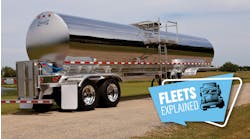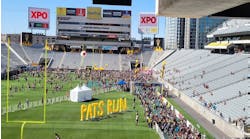The National Private Truck Council traces its lineage back to l939, when a rift developed between the private fleet and for-hire sides of the American Trucking Assns. (ATA). Private fleets feared that their basic right to run a fleet was threatened by the more dominant for-hire carriers, which viewed them as competitors. As a result, the National Council of Private Truck Owners was formed in 1939.
This split in membership was not at all the intent of the founders of ATA. They had envisioned a unified organization of competing or specialized interests working together for the common good of trucking. ATA was founded in l933 following a merger of two competing associations, the Federal Truck Assns. of America and the American Highway Freight Assn. The goal was to build a trucking industry consensus to help shape the federal regulation that became the Motor Carrier Act of l933.
All groups in trucking were represented among the ATA founders, including several private fleet leaders from such companies as Standard Oil of New Jersey, Kraft Food, Borden and Sun Oil. This umbrella federation was designed to present a generally harmonious national chorus of trucking interests, while allowing room for dissenting soloists before regulatory agencies. The original plan included the formation of a Private Carrier Conference. That goal was put aside, however, as the for-hire carrier perspective took center stage in ATA politics.
Not all private fleet members left the ATA to join the National Council of Private Truck Owners, which later changed its name to the Private Truck Council of America. Indeed, several private fleet members of ATA fought for separate recognition, but it wasn't until l947 that the Private Carrier Conference of the American Trucking Assns. was formed.
For the next 43 years, two well-respected trade associations represented private fleet trucking. By the l960s, the Private Carriers Conference had the largest number of members and was the largest Conference in the ATA, but the Private Truck Council had by far the biggest private truck fleets in terms of number of vehicles. One Private Carriers Conference member actually became chairman of the ATA. John Gill, from the Petroleum and Power Company of Rhode Island, is the only private fleet executive to have risen to the highest elected office at ATA.
In retrospect, many private and for-hire disputes amounted to stalling the inevitable. For-hire carriers adamantly opposed the right of private carriers to have their own for-hire authority. It wasn't until l978 that the now-defunct Interstate Commerce Commission allowed this to happen. But this issue, and others like it, kept competing associations as worthy adversaries and gave each group a rallying cry to show differentiated membership value.
Today, about one-third to one-half of private fleets have their own for-hire authority, and thousands of corporations operate private fleets in tandem with dedicated contract fleets provided by for-hire carriers.
Merger discussions that had grown louder over the years finally came to a head. In l987, the Private Carrier Conference of ATA changed its name to the National Private Trucking Assn. and disaffiliated itself from the ATA. The new NPTA began merger discussion with the Private Truck Council of America.
In l988, the National Private Truck Council was founded from the combined membership of the former rival groups. The following year, the newly-minted NPTC held its first annual Education/Management Conference in Washington, D.C.
And lived happily ever after.
Gary Petty is President and CEO of NPTC. His column appears monthly in FLEET OWNER.



